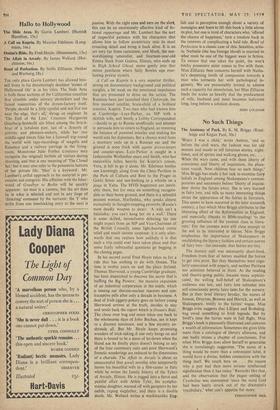No Such Things
The Anatomy of Puck. By K. M. Briggs. (Rout- ledge and Kegan Paul, 30s.) 'WHEN I was a child,' wrote Aubrey, 'and so before the civil wars, the fashion was for old women and maids to tell fabulous stories, night- times, and of sprites and walking ghosts, etc. . . . When the wars came, and with them liberty of conscience and liberty of inquisition, the phan- toms vanish. Now children fear no such things.' Miss Briggs has made it her task to examine fairy beliefs in England among Shakespeare's contem- poraries and successors before 'liberty of inquisi- tion' drove the fairies away. She is very learned in fairy lore, and tells us many interesting things about the appearance of the fairies in literature. This seems to have occurred in the later sixteenth century, a fact which Miss Briggs attributes to the liberating effect of the Reformation in England, and especially (thanks to Bible-reading) `to the growing influence of the yeoman class in litera- ture.' For the yeomen were still close enough to the soil to be interested in fairies. Miss Briggs emphasises the importance of Shakespeare in establishing the literary fashion and certain norms of fairy lore—for example, that fairies are tiny.
The literary cult was necessarily short-lived. Freedom from fear of heresy enabled the fairies to get into print. But they themselves were regu- larly associated with popery, and neither Puritans nor scientists believed in them. As the reading and theatre-going public became more sophisti- cated, the willing half-belief of Shakespeare's audience was lost, and fairy lore subsided into self-consciously pretty fairy tales for the nursery. But in their brief literary heyday, the names of Jonson, Drayton, Browne and Herrick, as well as Shakespeare, testify to the fairies' vogue. Miss Briggs even suggests that Lilliput and Brobding- nag owed something to Irish legends. But by Swift's time the fairies were in full flight. Miss Briggs's book is pleasantly illustrated and contains a wealth of information. Sometimes she gives little more than a catalogue of literary allusions, and one badly misses a chapter of conclusions. For when Miss Briggs does allow herself to generalise she is tantalisingly suggestive. 'The name of a thing would be more than a convenient label, it would have a divine, hidden connection with the thing itself. We touch here on . . . the reason why a pun had then more serious intellectual significance than it has today.' Remarks like that, and the observation that the pagan setting of Cymbeline was convenient 'since the word God had been lately struck out of the dramatist's vocabulary,' whet one's appetite for more.
CHRISTOPHER HILL














































 Previous page
Previous page